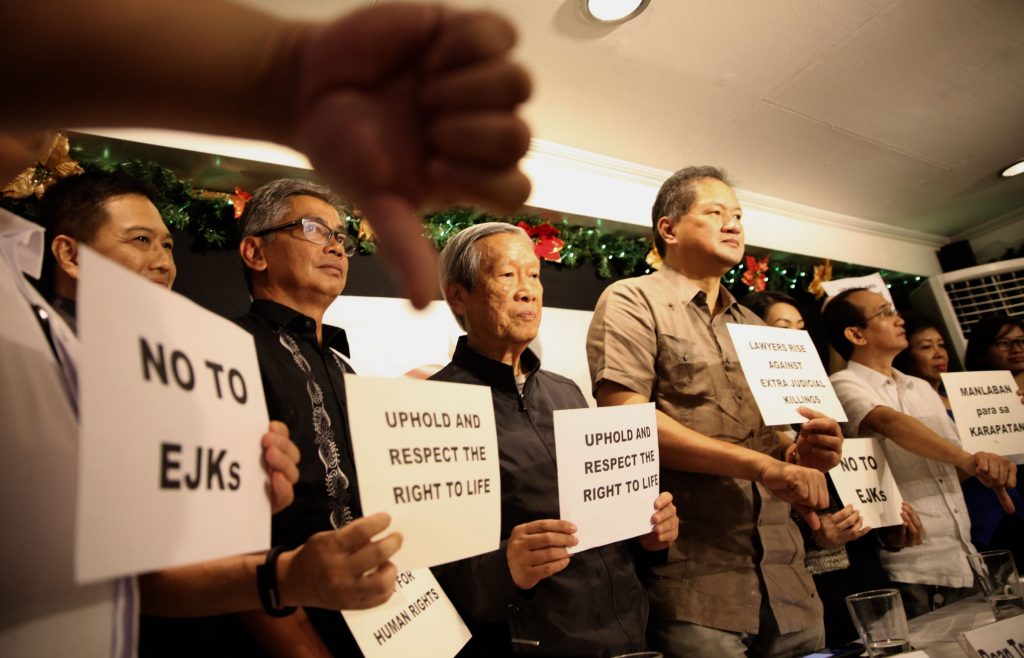MANILA, Philippines — A broad network of lawyers, judges, law professors and students was launched on Thursday, November 2, demanding an end to extrajudicial killings and the increasing human rights violations under the Duterte administration.
The group, Manlaban sa EJK or Mga Manananggol Laban sa (Lawyers Against) Extra Judicial Killings, said it would join forces with other sectors and groups “struggling against the descent of the country into the dark abyss of lawlessness, persecution of the poor, attacks against critics and human rights advocates and authoritarian methods or rule.”
The acronym of the group, which means “fight” or “resist,” is apparently their take on “nanlaban,” literally “fought back,” which is the invariable explanation police give for the thousands of suspected drug users and pushers killed in anti-narcotics operations.
“Members of the legal profession and law students who value sanctity of human rights and the equitable rule of law cannot stand idly by in the midst of these attacks on the right to life, liberty, dignity and security of the people. Today, we join the ever growing voices of protest against rampant killings which target the poor, to defend rights and demand accountability,” Manlaban said at its launch at the Kamuning Bakery and Cafe in Quezon City.
“We demand an end to extrajudicial killings as well as other ill-conceived draconian measures in any guise or form by the government and its instrumentalities and the genuine investigation and due accountability of the perpetrators,” it added.
Right from the get-go, one of the convenors, former University of the Philippines law dean Pacifico Agabin said Duterte cannot escape accountability for the bloodshed.
“There is such a thing as command responsibility kasi we ratified (the) Rome Statute,” the international treaty that led to the creation of the International Criminal Court, he said.
“Kung sinuman ang commander-in-chief and kung may pattern na ng patayan at wala pang ginagawa ang commander-in-chief (Whoever the commander-in-chief is, if there is a pattern to the killings and the commander-in-chief does nothing), then he is responsible,” Agabin stressed.
Agabin also called the government’s description of its anti-drug campaign as a “war” a “propaganda device” that was “misleading kasi iisipin natin na ang war ay labanan at justified ang killing pero ito wala namang labanan eh (because we would think that it was a war that involved fighting and the killings are justified but there is no fighting happening here).”
“We are here because we want to unite, cooperate and coordinate our independent moves into one,” said Edre Olalia, president of the National Union of People’s Lawyers, one of Manlaban’s convenors.
“We believe the duty of lawyers is not to apologize, not to deodorize, not to rationalize violations of rights and due process … but to consistently and uncompromisingly uphold human rights,” Olalia said.
Lawyer, educator and environmental policy expert Antonio Gabriel La Viña, former dean of the Ateneo School of Government, said they believe legal initiatives against violators of human rights have not been maximized, thus they intend to focus on this.
Other convenors of Manlaban sa EJK are former Senator Rene Saguisag, former Representative Lorenzo Tañada III, former Representative Neri Colmenares, Atty. Minerva Ambrosio, Professor Victoria Avena, Atty. Roberto Eugenio Cadiz, De La Salle University College of Law Dean Jose Manuel Diokno, Pamantasan ng Lunsod ng Maynila College of Law Dean Ernesto Maceda Jr., Atty. Rachel Pastores, Professor Roberto Rafael Pulido, Atty. Evalyn Ursua and Quezon City Judge Cleto Villacorta III.
Groups supporting the initiative include the Association of Law Students in the Philippines, Paralegal Volunteers Organization, National Union of Peoples’ Lawyers, and UP Diliman College of Law Student Government.
Manlaban said it would undertake advocacy campaigns through forums and provide platforms on the issue of EJKs and rights violations, especially in law schools. It will also provide concrete legal assistance to victims, issue opinions and statements, and join mobilizations against the killings.
The group said that at least 12,000 persons, mostly from poor communities, have been killed since the Duterte administration began its war against drugs.
“In a blatant disregard of the right to life, thousands of victims who are poor and powerless have been targeted and brutally, nay mercilessly, executed by the state, its agents, proxies with blatant contempt and disregard of due process,” Manlaban said.
“President Duterte’s public order for the police to shoot human rights activists if they are instructing justice not only endangers human rights defenders, but is an outright attack on human rights and freedoms. With violence on all frontS of President Duterte’s war, there is deep fear indeed among the living that death will come, for virtually any one, sooner at the door,” the group added.
Olalia said the NUPL has so far filed three murder cases over EJKs and filed injunctions that prompted the Quezon City Police District to stop a door-to-door drug testing campaign, and also the Legazpi City government to take back plans to compel residents to report visitors.
Olalia stressed the importance of “accountability” for the EJKs and other rights violations and said they would set up a social media account to accept citizens’ concerns. Complaints may also be emailed to manlabansaejk@gmail.com.
Lawyer June Ambrosio, a member of the Integrated Bar of the Philippines, said a human rights summit on November 23 to 24 intends to mobilize law students to help victims not only of the drug war but other forms of EJKs, which also happen in the course of counterinsurgency.

